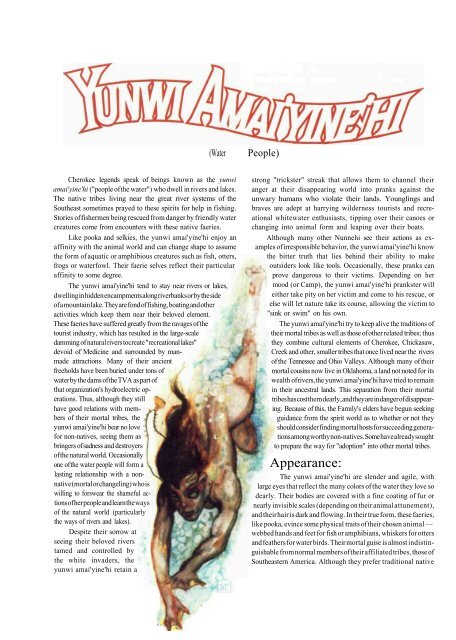Changeling - Players Guide.pdf
Changeling - Players Guide.pdf
Changeling - Players Guide.pdf
Create successful ePaper yourself
Turn your PDF publications into a flip-book with our unique Google optimized e-Paper software.
Cherokee legends speak of beings known as the yunwi<br />
amai'yine'hi ("people of the water") who dwell in rivers and lakes.<br />
The native tribes living near the great river systems of the<br />
Southeast sometimes prayed to these spirits for help in fishing.<br />
Stories of fishermen being rescued from danger by friendly water<br />
creatures come from encounters with these native faeries.<br />
Like pooka and selkies, the yunwi amai'yine'hi enjoy an<br />
affinity with the animal world and can change shape to assume<br />
the form of aquatic or amphibious creatures such as fish, otters,<br />
frogs or waterfowl. Their faerie selves reflect their particular<br />
affinity to some degree.<br />
The yunwi amai'yine'hi tend to stay near rivers or lakes,<br />
dwelling in hidden encampments along riverbanks or by the side<br />
of a mountain lake. They are fond of fishing, boating and other<br />
activities which keep them near their beloved element.<br />
These faeries have suffered greatly from the ravages of the<br />
tourist industry, which has resulted in the large-scale<br />
damming of natural rivers tocreate "recreational lakes"<br />
devoid of Medicine and surrounded by manmade<br />
attractions. Many of their ancient<br />
freeholds have been buried under tons of<br />
water by the dams of the TVA as part of<br />
that organization's hydroelectric operations.<br />
Thus, although they still<br />
have good relations with members<br />
of their mortal tribes, the<br />
yunwi amai'yine'hi bear no love<br />
for non-natives, seeing them as<br />
bringers of sadness and destroyers<br />
of the natural world. Occasionally<br />
one of the water people will form a<br />
lasting relationship with a nonnative<br />
(mortal or changeling) who is<br />
willing to forswear the shameful actions<br />
of her people and learn the ways<br />
of the natural world (particularly<br />
the ways of rivers and lakes).<br />
Despite their sorrow at<br />
seeing their beloved rivers<br />
tamed and controlled by<br />
the white invaders, the<br />
yunwi amai'yine'hi retain a<br />
(Water People)<br />
strong "trickster" streak that allows them to channel their<br />
anger at their disappearing world into pranks against the<br />
unwary humans who violate their lands. Younglings and<br />
braves are adept at harrying wilderness tourists and recreational<br />
whitewater enthusiasts, tipping over their canoes or<br />
changing into animal form and leaping over their boats.<br />
Although many other Nunnehi see their actions as examples<br />
of irresponsible behavior, the yunwi amai'yine'hi know<br />
the bitter truth that lies behind their ability to make<br />
outsiders look like tools. Occasionally, these pranks can<br />
prove dangerous to their victims. Depending on her<br />
mood (or Camp), the yunwi amai'yine'hi prankster will<br />
either take pity on her victim and come to his rescue, or<br />
else will let nature take its course, allowing the victim to<br />
"sink or swim" on his own.<br />
The yunwi amai'yine'hi try to keep alive the traditions of<br />
their mortal tribes as well as those of other related tribes; thus<br />
they combine cultural elements of Cherokee, Chickasaw,<br />
Creek and other, smaller tribes that once lived near the rivers<br />
of the Tennessee and Ohio Valleys. Although many of their<br />
mortal cousins now live in Oklahoma, a land not noted for its<br />
wealth of rivers, the yunwi amai'yine'hi have tried to remain<br />
in their ancestral lands. This separation from their mortal<br />
tribes has cost them dearly, and they are in danger of disappearing.<br />
Because of this, the Family's elders have begun seeking<br />
guidance from the spirit world as to whether or not they<br />
should consider finding mortal hosts for succeeding generations<br />
among worthy non-natives. Some have already sought<br />
to prepare the way for "adoption" into other mortal tribes.<br />
Appearance:<br />
The yunwi amai'yine'hi are slender and agile, with<br />
large eyes that reflect the many colors of the water they love so<br />
dearly. Their bodies are covered with a fine coating of fur or<br />
nearly invisible scales (depending on their animal attunement),<br />
and their hair is dark and flowing. In their true form, these faeries,<br />
like pooka, evince some physical traits of their chosen animal —<br />
webbed hands and feet for fish or amphibians, whiskers for otters<br />
and feathers for water birds. Their mortal guise is almost indistinguishable<br />
from normal members of their affiliated tribes, those of<br />
Southeastern America. Although they prefer traditional native


